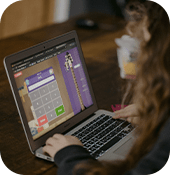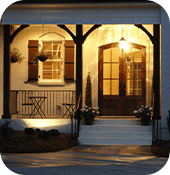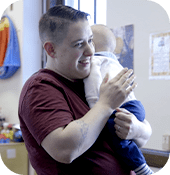GNMH is a state-designated Community Mental Health Center (CMHC) serving Southern Hillsborough County, providing comprehensive and results-based services for mental health and substance use disorders. GNMH serves individuals and families of all ages, and no one is turned away due to insurance or financial limitations.
Child, Adolescent & Family Services include:
- Open Access intake program, to receive a full evaluation and appropriate treatment plan to meet client needs. Pre-pandemic this was a walk-in service.
- Individual, group and family therapy
- Creating Connections NH, a substance use disorder evaluation and treatment program, based on The Seven Challenges® method, for clients 12 years and older, including group therapy and parent/caregiver groups
- Psychiatric evaluation and medication management for clients engaged in therapy
- Project RENEW, empowering youth to create future opportunities
- Children’s Assertive Community Treatment (C-ACT) program, designed to reduce hospitalizations and agency involvement
- Functional Support Services, designed to help clients develop resiliency and to function at their highest level in their own communities
- InteGreat Health program, providing clients with primary and behavioral health care in one convenient location, resulting in whole person health. Now serving clients ages 16 and older
- ACEs Mobile Response Team, to reduce the impact of childhood adverse experiences (ACEs) by being immediately available to children up to age 18 who are present during an opioid overdose
- Mental Health in the Schools program
- Deaf Services program, available statewide to provide mental health and/or substance use disorder treatment to those who are Deaf or Hard of Hearing
- HOPE: Help Overcoming Psychosis Early – intervention for First Episode Psychosis (FEP), to improve the chances for a person with psychosis to lead a healthy and productive life
Adult and Older Adult Services include:
- Open Access intake program, to receive a full evaluation and appropriate treatment plan to meet client needs. Pre-pandemic, this was a walk-in service
- Individual and group therapy
- Substance Use Disorder treatment programs
- Integrated Dual Disorder Treatment (IDDT) program for adults challenged simultaneously with a mental health and substance use disorder
- Psychiatric evaluation and medication management for clients engaged in therapy
- Assertive Community Treatment (ACT) program, designed to reduce hospitalizations and agency involvement
- Functional Support Services, designed to help clients develop resiliency and to function at their highest level in their own communities
- InteGreat Health program, providing clients with primary and behavioral health care in one convenient location, resulting in whole person health
- Drug Court program, to allow those involved with the criminal justice system receive vital treatment instead of incarceration
- Mental Health Court program, to allow those involved with the criminal justice system receive vital treatment instead of incarceration
- Deaf Services program, available statewide to provide mental health and/or substance use disorder treatment to those who are Deaf or Hard of Hearing
- HOPE: Help Overcoming Psychosis Early – intervention for First Episode Psychosis (FEP), to improve the chances for a person with psychosis to lead a healthy and productive life
GNMH has 24/7 Emergency lines, both for English speakers and one for non-English speakers, which will immediately find an interpreter who speaks in the caller’s language and who will be able to assist the caller. GNMH emergency lines are open to anyone, not just clients of the agency (English and non-English speaking phone numbers above). GNMH office hours vary, especially with the pandemic, and many services are being provided via Telehealth. Clients who need in-person services can make an appointment by calling their provider, or if a new client, call the main phone number to request an intake appointment. Our website has detailed information about all our services which are available to adults, children, adolescents, young adults, families and older adults. Any questions can be answered by calling the main phone number (English and non-English speaking phone numbers above).




